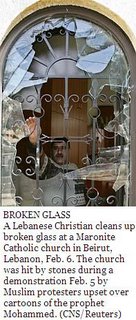Catholic News Service
 BEIRUT, Lebanon (CNS) -- Catholic and Muslim religious leaders condemned the riot that erupted in Beirut when an estimated 30,000 Muslims protested against the publication of satirical cartoons of the prophet Mohammed in European newspapers.
BEIRUT, Lebanon (CNS) -- Catholic and Muslim religious leaders condemned the riot that erupted in Beirut when an estimated 30,000 Muslims protested against the publication of satirical cartoons of the prophet Mohammed in European newspapers.
The Danish Consulate was set ablaze, a Maronite Catholic church and the headquarters of the Greek Orthodox archbishop were vandalized, and numerous roadside shrines were smashed in the Feb. 5 violence. Many of the protesters wielded pipes and various weapons; many wore headbands and waved flags imprinted with the slogan "Prophet's soldiers."
Archbishop Paul Youssef Matar of Beirut told Catholic News Service he believed the motivation behind the violence was political. Religious and political leaders in Lebanon denounced the violence, attributing it to outside interference to instigate chaos in the country. Many Lebanese believe that Syria, which ended its 30-year occupation of Lebanon in April, was behind the incident, and the archbishop speculated that many of those involved in the disruption were paid to participate and were incited to be violent.
Lebanese Prime Minister Fouad Siniora, a Sunni Muslim, said "what happened today was an attack against Islam and the principles of the Holy Quran." He pointed out that "the protesters took a definite stand by taking arms; consequently, they came for war."
Siniora visited Archbishop Matar and Beirut's Orthodox Archbishop Elias Aoude before inspecting damage at St. Maron Catholic Church. Later, in an interview on Voice of Lebanon radio, Siniora said intruders "came to stir strife among the Lebanese themselves and between the Lebanese and the world."
More than 29 people were wounded in the violence and one was reported killed. Lebanon's An Nahar newspaper reported that of the 192 protesters arrested by security forces 77 were Syrian, 42 were Palestinian and approximately 25 were Bedouin, members of an Arabic nomadic people.
Father Elias Feghali, pastor of St. Maron Catholic Church, said he was in the sacristy preparing for the 10:30 a.m. Mass Feb. 5 when he first heard the mob. Moments later, he heard glass shattering from inside the church and became even more frightened when he heard shooting coming from the streets.
Some of the demonstrators attempted to climb up the exterior of the church.
"I thought, 'These are not people. These are monsters,'" Father Feghali told Catholic News Service. He said it was impossible to celebrate Mass, because parishioners could not make their way to St. Maron's in the violence.
The church is in the same neighborhood as the Danish Embassy; the cartoons originally were published in a Danish newspaper last fall. The cartoons are considered blasphemous because, first of all, Islam does not allow depictions of Mohammed, and, second, they show Mohammed in a number of disrespectful ways. One cartoon, for example, shows Mohammed in a turban shaped as a bomb.
One Muslim cleric was reported to have shouted from a loudspeaker, "Do not harm the holy church; the anger is against Denmark and not Christians." Three windows in St. Maron's were broken.
"It's not a matter of the damage. It's a matter of symbol," Archbishop Matar said.
He said one of the protesters was seen climbing up the building and trying to pry open a window to plant a bomb in the church.
"Thank God, the window didn't open, but the danger was very present," the archbishop said.
"The government's role was blatant and unacceptable when it comes to protecting churches and worshippers," said Archbishop Matar. "They knew 24 hours in advance" that the demonstration would take place.
"This represents a weakness in the government," he said, particularly in light of violence in Syria the day before, in which demonstrators set fire to the Danish and Norwegian embassies.
Cardinal Nasrallah P. Sfeir, Maronite patriarch, said he was "greatly disturbed" and called upon all Lebanese to "adhere to a national unity that is strongly needed."
A delegation of Muslim clerics met with the patriarch late Feb. 5 and urged Lebanese citizens not to react "because we are all Lebanese who are keen to create national unity."
Archbishop Matar commended the residents of the predominantly Christian neighborhood around St. Maron's for remaining calm.
"They were very wise; they didn't react. It was very dangerous. They saw their cars burned, their houses broken into," he said.
"I think the Lebanese people have shown that they don't want to come back to the war," said the archbishop. "They don't want a fight between Muslims and Christians."
"If we were to have responded in the same way (as the protesters), we would have a civil war," said Father Feghali.
Michel Aoun, a Maronite Catholic member of Parliament and leader of the Free Patriotic Movement, speaking from St. Maron Church Feb. 5 said, "What happened is a plan to instigate strife in the country" and demanded the resignation of Lebanon's government for its failure to protect its citizens. If the rioters were Syrian and Palestinian, he said, "Isn't Lebanese law applicable to them?"
Lebanon's interior minister resigned that evening.
This Post's Link

No comments:
Post a Comment